By, Steve Finkelstein – Senior Partner and David Giffin – Partner and HR Practice Leader
GREAT STRATEGIES CAN BE DESTROYED BY POOR CULTURES
“Culture eats strategy for breakfast” Peter Drucker
We have both seen over time that great strategies can be destroyed by poor cultures. The famous management guru, Peter Drucker, has often received credit for stating “Culture eats strategy for breakfast.” The statement is as true today as it was when Drucker originally wrote it.
Business leaders have found, usually too late, that the pre-existing culture of a company that doesn’t match a new strategy, can stop a well articulated strategy in its tracks. At a minimum, culture will constrain the effectiveness of your strategy.
“Your bottom line next year may be determined by your strategy but your future bottom line will be more influenced by your culture.”
So, what is this phenomenon that lurks inside your company? Culture is the personality of a company. It touches everything! The culture of any company is simply the established pattern of doing things. Culture includes the shared beliefs, norms, and values within an organization. It is what determines the attitude and the behavior of any employee in a given situation. No matter how good your strategy is, when it comes down to it, how your people go about the execution of their responsibilities every day makes the difference.
“Strategies can be copied but no one can copy our culture”
Culture must be recognized for the power it represents in an organization. Because an inadequate culture or one that isn’t aligned with your strategy, at best, constrains strategy, you should take steps to understand your culture and learn to operate within its boundaries. If you are unwilling to live with your current culture because it is holding your company back from executing your strategy, then you have to be prepared to work hard and long to positively impact your broken culture.
Break – To read more about how culture can eat strategy for breakfast click here:
So where do you start if your company’s strategy is being negatively impacted by your culture? You start with the basics. You take a hard look at your procedures, how you communicate, how your decision-making process works, and how conflict is handled. You challenge your values and verify if they are being followed. You also consider who gets hired, fired, promoted, developed, and how employees are paid. Last, but not least, you take a look in the mirror to consider the quality of day-to-day management and leadership, as well as how employees relate to each other.
Sound a little overwhelming? A little, but building a strong company culture that is in complete alignment with your strategy is one of the most rewarding undertakings your company can tackle. A great culture attracts the best workers, increases overall retention, improves performance, lowers cost, and most importantly, ensures your strategy will propel you into the future.
How do you make the intangible of culture come to life? The first step is to be sure your company’s core values are defined and clearly understood. Next, you develop the behaviors that support the core values. A recent project of ours is a great example of what companies can do if they truly want to drive cultural change:
Core Value: Excellence: We strive for excellence in everything we do, every day. We provide high quality products and services that we stand behind to maximize customer satisfaction.
Behaviors / actions:
· Strive for excellence by doing it right the first time
· Project teams define excellence for each project
· Every employee has at least 1 metrics / KPI to measure excellence for their job;
· Every employee or team asks for customer feedback during the project
· No one criticizes an idea without providing an alternative solution;
· When solving a problem, develop more than one right answer
Trust: We build trust by meeting our commitments and establishing strong relationships. There is high integrity and ethics in all interactions, with employees, customers, and suppliers in our words and actions.
“Culture provides greater discipline than policies and disciplinary actions.”
Behaviors / actions:
· Admit weaknesses and mistakes
· Give one another the benefit of the doubt before arriving at a negative conclusion
· Take risks in offering feedback and assistance
· Praise in public and reprimand in private
· Offer and accept apologies without hesitation
· Live up to your word, do what you say, meet your commitments
· Delegate responsibilities and authority to the lowest level
· Avoid rumors and honor confidentiality
What can be done to sustain the core values and culture?
· Lead from the top – actions speak louder than words
· First Level and Middle Management Support – they can make or break any initiative
· Develop a baseline via a survey. Identify areas of strengths and weaknesses
· Recognize outstanding display of the core values and culture
· Celebrate successes
· Hold management accountable for living the culture on their goals based on survey feedback.
· Measure financial and other areas of performance.
Question: What words or phrases would your people use to describe your cultural brand?
If you have any questions or would like to have a conversation around culture you can call Steve (314-409-6969) or David (314-277-2217) or email either of us steve.finklestein@experience-on-demand.com or david.giffin@experience-on-demand.com .
